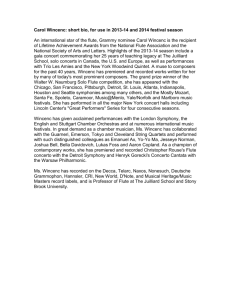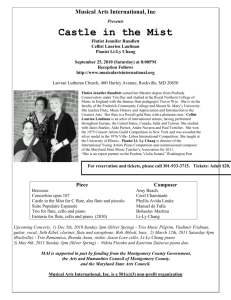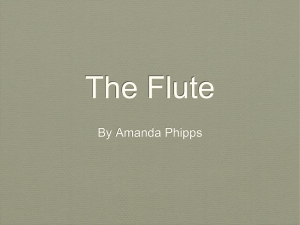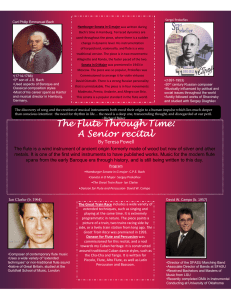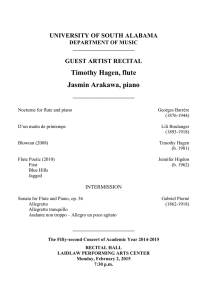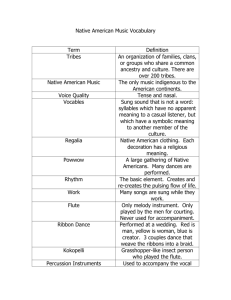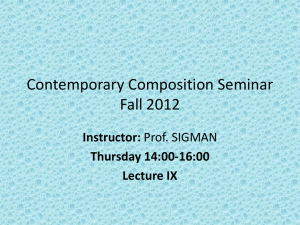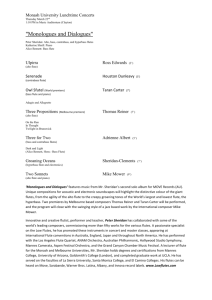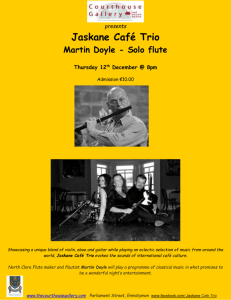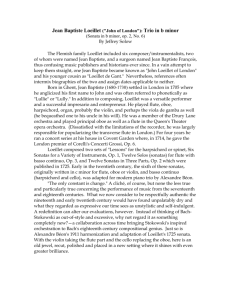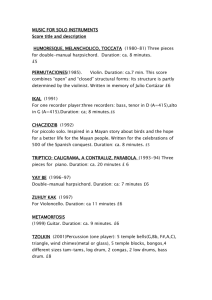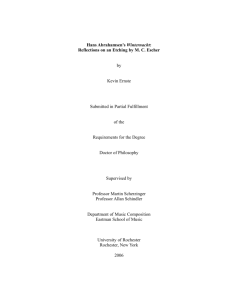here - Janice Misurell
advertisement
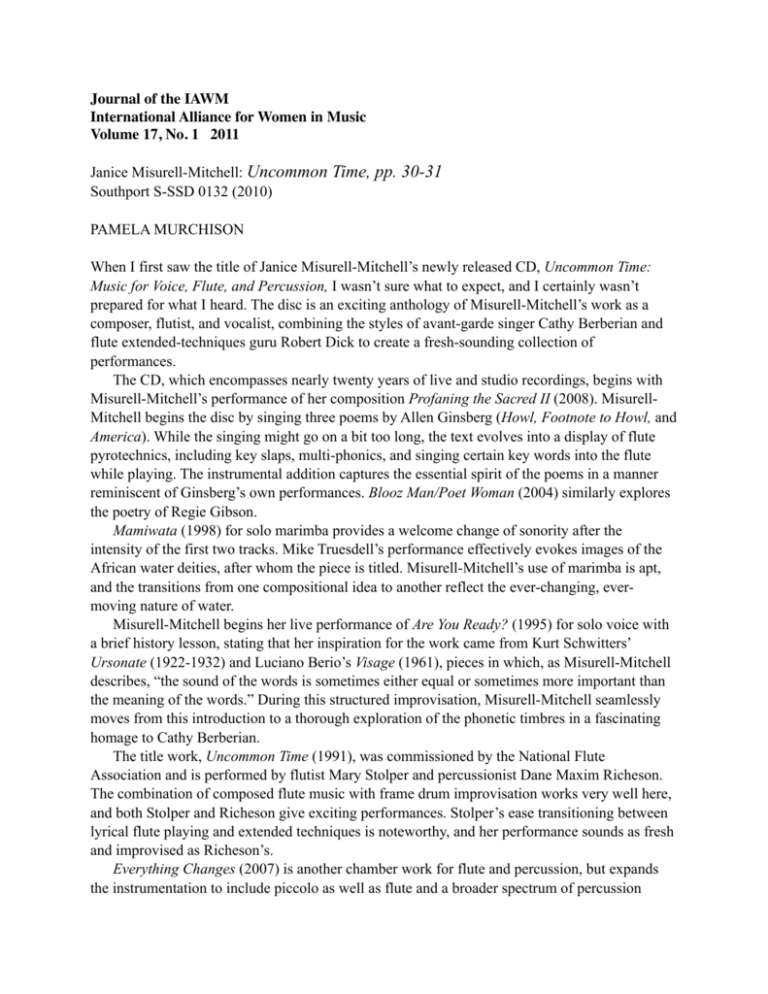
Journal of the IAWM International Alliance for Women in Music Volume 17, No. 1 2011 Janice Misurell-Mitchell: Uncommon Time, pp. 30-31 Southport S-SSD 0132 (2010) PAMELA MURCHISON When I first saw the title of Janice Misurell-Mitchell’s newly released CD, Uncommon Time: Music for Voice, Flute, and Percussion, I wasn’t sure what to expect, and I certainly wasn’t prepared for what I heard. The disc is an exciting anthology of Misurell-Mitchell’s work as a composer, flutist, and vocalist, combining the styles of avant-garde singer Cathy Berberian and flute extended-techniques guru Robert Dick to create a fresh-sounding collection of performances. The CD, which encompasses nearly twenty years of live and studio recordings, begins with Misurell-Mitchell’s performance of her composition Profaning the Sacred II (2008). MisurellMitchell begins the disc by singing three poems by Allen Ginsberg (Howl, Footnote to Howl, and America). While the singing might go on a bit too long, the text evolves into a display of flute pyrotechnics, including key slaps, multi-phonics, and singing certain key words into the flute while playing. The instrumental addition captures the essential spirit of the poems in a manner reminiscent of Ginsberg’s own performances. Blooz Man/Poet Woman (2004) similarly explores the poetry of Regie Gibson. Mamiwata (1998) for solo marimba provides a welcome change of sonority after the intensity of the first two tracks. Mike Truesdell’s performance effectively evokes images of the African water deities, after whom the piece is titled. Misurell-Mitchell’s use of marimba is apt, and the transitions from one compositional idea to another reflect the ever-changing, evermoving nature of water. Misurell-Mitchell begins her live performance of Are You Ready? (1995) for solo voice with a brief history lesson, stating that her inspiration for the work came from Kurt Schwitters’ Ursonate (1922-1932) and Luciano Berio’s Visage (1961), pieces in which, as Misurell-Mitchell describes, “the sound of the words is sometimes either equal or sometimes more important than the meaning of the words.” During this structured improvisation, Misurell-Mitchell seamlessly moves from this introduction to a thorough exploration of the phonetic timbres in a fascinating homage to Cathy Berberian. The title work, Uncommon Time (1991), was commissioned by the National Flute Association and is performed by flutist Mary Stolper and percussionist Dane Maxim Richeson. The combination of composed flute music with frame drum improvisation works very well here, and both Stolper and Richeson give exciting performances. Stolper’s ease transitioning between lyrical flute playing and extended techniques is noteworthy, and her performance sounds as fresh and improvised as Richeson’s. Everything Changes (2007) is another chamber work for flute and percussion, but expands the instrumentation to include piccolo as well as flute and a broader spectrum of percussion instruments, including marimba and snare drum. Misurell-Mitchell’s performance with Richeson incorporates both the original German and English translations of Bertolt Brecht’s poem Alles wandelt sich. Misurell-Mitchell explores the text vocally and instrumentally, choosing sibilant or percussive sounds on the flute evocative of the consonant sounds of both languages. In the penultimate track, Misurell-Mitchell skillfully makes use of the alto flute’s haunting timbre in the elegy Una voce perduto: in memoriam, Ted Shen (2003), eloquently performed by Caroline Pittman. The final work is A Silent Woman (2002), which Misurell-Mitchell performs with Gospel singer Dee Alexander, clarinetist Edward Wilkerson, Jr., and pianist Ann Ward. Using text by twelfth-century composer Beatritz de Dia, A Silent Woman combines jazz and contemporary classical styles to satirize the historical silencing and segregation of women by many religious organizations. The performance is engaging and Misurell-Mitchell’s ingenious use of avantgarde techniques for both the vocalist and instrumentalists creates a work that is pure theater. The sheer variety of sounds makes A Silent Woman a fitting work to close the CD, a time capsule of Misurell-Mitchell’s compositions and performances over the past two decades. Misurell-Mitchell’s excellence as both a performer and composer is showcased on Uncommon Time and her music sounds fresh and timeless. The CD fully exploits the infinite variety of sound and expression via the conduit of the human voice; the use of flute and percussion only broadens the spectrum, rather than competing with it. Flutist Pamela Murchison serves on the faculty at Frostburg State University. She is a member of the West Virginia and Akron Symphonies, and she maintains an active career as a chamber musician. Her doctoral research topic explores the music of composer Amy Williams.
